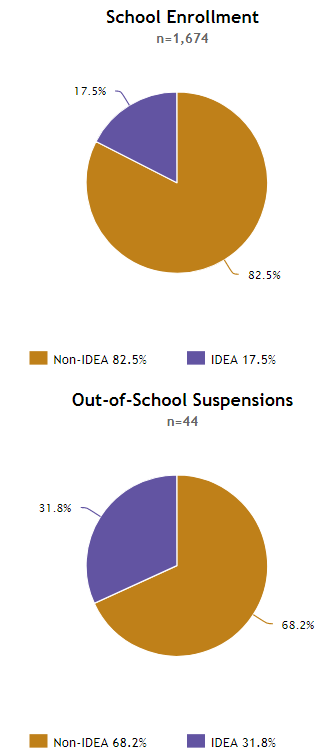Are School Suspensions More Harmful Than Helpful? Examining The Evidence

Table of Contents
The Negative Impact of School Suspensions on Academic Performance
School suspensions significantly impact a student's academic trajectory, often leading to detrimental long-term consequences.
Increased Absenteeism and Lower Graduation Rates
A strong correlation exists between school suspensions and decreased school attendance. Missing classes due to suspension results in falling behind in coursework, making it difficult to catch up. This academic setback can contribute to lower grades, increased risk of grade repetition, and ultimately, lower graduation rates.
- Research indicates: A study published in the Journal of Educational Research found a direct link between suspension frequency and decreased graduation rates. Students with multiple suspensions were significantly less likely to graduate high school on time.
- Academic impact: Beyond missed classes, suspensions disrupt learning routines, damage student-teacher relationships impacting future learning opportunities, and often lead to a sense of discouragement and alienation from the educational process.
The Cycle of Suspension and Further Disengagement
Repeated suspensions create a vicious cycle. The isolation and alienation experienced can lead to increased behavioral problems, further increasing the likelihood of future suspensions. This cycle can perpetuate negative school experiences and ultimately lead to dropping out.
- Social and emotional effects: The stigma associated with suspension can lead to feelings of shame, anger, and resentment, hindering a student's ability to reintegrate into the school environment.
- Alternative approaches: Instead of suspensions, schools should prioritize restorative practices that address the root causes of misbehavior, fostering a more supportive and inclusive school climate.
The Social and Emotional Consequences of Suspension
Beyond academic consequences, school suspensions have profound social and emotional impacts on students.
Increased Risk of Mental Health Issues
Suspension is strongly linked to increased risks of depression, anxiety, and other mental health challenges. The isolation, stigma, and disruption to routine can exacerbate existing mental health issues or trigger new ones.
- Research findings: Studies have demonstrated a significant correlation between suspension and increased rates of mental health problems, including self-harm and suicidal ideation among affected students.
- Long-term effects: These mental health consequences can persist long after the suspension, affecting a student's overall well-being and future success.
Impact on Social Development and Relationships
Suspensions disrupt a student's social relationships with peers and teachers. The sense of isolation and stigma associated with suspension can damage their self-esteem and make it difficult to rebuild trust and positive relationships.
- Social isolation: Time away from school interrupts the crucial social learning that takes place in the classroom and during interactions with peers and teachers.
- Disruption to social development: This social isolation can have far-reaching effects on a student's ability to form healthy relationships, navigate social situations, and develop crucial social-emotional skills.
Alternative Disciplinary Approaches and Their Effectiveness
Instead of relying heavily on school suspensions, schools can implement alternative disciplinary approaches proven to be more effective in addressing student behavior and improving school climate.
Restorative Justice Practices
Restorative justice focuses on repairing harm caused by misbehavior through dialogue, empathy, and accountability. It empowers students to take responsibility for their actions and understand the impact of their behavior on others.
- Conflict resolution and mediation: Restorative practices involve bringing together the student who misbehaved, the victim(s), and other relevant stakeholders to collaboratively find solutions. This process fosters empathy and understanding.
- Effectiveness: Studies have shown that restorative justice practices can significantly reduce suspension rates, improve school climate, and increase student engagement.
Positive Behavior Interventions and Supports (PBIS)
PBIS is a proactive, data-driven framework that focuses on preventing misbehavior through clear expectations, positive reinforcement, and individualized support.
- Key components of PBIS: This framework involves establishing clear behavioral expectations, teaching those expectations explicitly, reinforcing positive behavior, and providing individualized support for students who struggle.
- Effectiveness of PBIS: Research demonstrates that PBIS can significantly reduce disciplinary incidents, improve school climate, and create a more positive learning environment for all students.
Early Intervention and Support Services
Early intervention is crucial in preventing disciplinary issues. Providing students at risk with access to support services like counseling, tutoring, and mentoring can address underlying issues that contribute to misbehavior.
- Examples of support services: These services can address academic challenges, emotional difficulties, and social-emotional needs.
- Preventing suspensions through early intervention: Proactive support can help prevent escalation of minor incidents into more serious disciplinary problems that necessitate suspensions.
Conclusion
The evidence overwhelmingly suggests that school suspensions are more harmful than helpful. They negatively impact academic performance, contribute to social and emotional difficulties, and perpetuate a cycle of disengagement. Alternative disciplinary approaches, such as restorative justice practices, PBIS, and early intervention, offer more effective and humane ways to address student behavior and create safer, more supportive learning environments. By critically examining the evidence and embracing alternative approaches, we can move beyond the detrimental effects of school suspensions and create safer, more supportive learning environments for all students. Further research into alternative strategies and their implementation in various school settings is crucial for improving school discipline and ensuring positive outcomes for all students. Consider exploring resources on restorative justice and PBIS to learn more about implementing these effective strategies in your school community.

Featured Posts
-
 Chicagos Harry Potter Shop Grand Opening And Must See Items
May 02, 2025
Chicagos Harry Potter Shop Grand Opening And Must See Items
May 02, 2025 -
 The Trump Tariffs And The Question Of Judicial Review
May 02, 2025
The Trump Tariffs And The Question Of Judicial Review
May 02, 2025 -
 Your Guide To Newsrounds Broadcast Times On Bbc Two Hd
May 02, 2025
Your Guide To Newsrounds Broadcast Times On Bbc Two Hd
May 02, 2025 -
 Doctor Whos Future Uncertain Showrunner Hints At Possible Hiatus
May 02, 2025
Doctor Whos Future Uncertain Showrunner Hints At Possible Hiatus
May 02, 2025 -
 Riot Fest Announces 2025 Lineup Featuring Green Day And Weezer
May 02, 2025
Riot Fest Announces 2025 Lineup Featuring Green Day And Weezer
May 02, 2025
